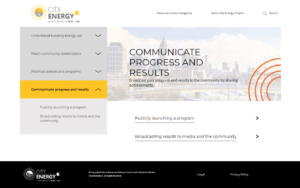New, free collection of pioneering tools shows cities how to reduce building energy waste to meet ambitious climate goals.

Across the country, U.S. mayors and local leaders are taking action on ambitious and aggressive climate goals. To make these goals a reality, today the Institute for Market Transformation (IMT) and the Natural Resources Defense Council (NRDC) announced the launch of the City Energy Project Resource Library.
A free, interactive hub of pioneering best practices and plug-and-play tools, the City Energy Project Resource Library is a comprehensive blueprint to help cities and local leaders significantly boost energy efficiency in buildings and, in turn, cut energy waste, strengthen local economies, reduce harmful pollution, and increase equity in addressing climate change.
“Five years ago, we launched the City Energy Project to harness the power of visionary local governments to make significant, real progress on combating climate change by reducing harmful emissions and wasted energy in buildings,” says Katharine McCormick, Director of the City Energy Project for NRDC. “The 20 participating City Energy Project cities are pioneers on their way to collectively reducing carbon emissions by an estimated 9 million metric tons annually by the year 2030. Now, with the launch of the City Energy Project Resource Library, cities across the U.S. have the blueprints they need to successfully deploy their own efficiency efforts and make ambitious goals a reality.”
Pioneering Best Practices and Tools Customized for Maximum Local Effect
 Today, buildings are the single largest user of energy and source of carbon pollution in the U.S. In many urban communities, they can account for as much as 60-80 percent of carbon pollution. Recognizing this, the City Energy Project Resource Library combines new guides, tools, templates, and checklists with city-specific, real-world examples pulled from participating City Energy Project cities to help city sustainability offices, mayor’s offices, and leaders developing climate plans and solutions to customize their energy efficiency efforts for maximum return in their individual jurisdictions.
Today, buildings are the single largest user of energy and source of carbon pollution in the U.S. In many urban communities, they can account for as much as 60-80 percent of carbon pollution. Recognizing this, the City Energy Project Resource Library combines new guides, tools, templates, and checklists with city-specific, real-world examples pulled from participating City Energy Project cities to help city sustainability offices, mayor’s offices, and leaders developing climate plans and solutions to customize their energy efficiency efforts for maximum return in their individual jurisdictions.
“Energy-efficient buildings are a win for everyone, and cities are hotbeds of innovation for creating efficiency solutions that reduce monthly bills, boost property value, create local jobs, and improve community health,” says Julie Hughes, IMT’s Managing Director of Programs and Director of the City Energy Project for IMT. “One of the main goals of the City Energy Project was to pioneer best practices for others to follow. The City Energy Project Resource Library is full of replicable, scalable solutions that are now being adopted nationwide to achieve results, drive demand for better buildings, and turbocharge the collective savings and benefits. What’s more, the Library is designed to meet each city where it is, whether it is taking its first steps toward deploying efficiency or is a front-runner seeking to raise the bar.”
Funded by a partnership of Bloomberg Philanthropies, the Doris Duke Charitable Foundation, and The Kresge Foundation, the City Energy Project launched in January 2014 with 10 cities: Atlanta; Boston; Chicago; Denver; Houston; Kansas City, Mo.; Los Angeles; Orlando; Philadelphia; and Salt Lake City. In November 2016, the project expanded to include Des Moines, Iowa; Fort Collins, Co.; Miami-Dade County, Fla.; New Orleans; Pittsburgh; Providence, R.I.; Reno, Nev.; San José; St. Louis, and St. Paul, Minn.
Through the City Energy Project, participating cities are making substantial progress on improving building energy use and reducing associated pollution. They are overseeing innovative, building-focused policies that cover more than 43,000 commercial buildings representing 5.7 billion square feet of space across the U.S. These policies should drive greater market awareness of how buildings are using energy and also increase investment in efficiency. More than 7,700 stakeholders were engaged through one-on-one outreach, as well as more than 280 workshops, to ensure that efficiency policies and programs were crafted to be most effective in each city. And, more than 2,200 buildings representing 369 million square feet of space participated in City Energy Project-supported challenge programs that drove tangible energy savings in municipal and private buildings.
In addition to being accessible online at www.cityenergyproject.org, the City Energy Project Resource Library’s offerings are now being deployed through the robust local and regional networks created through the project, through strong partner relationships with organizations such as the Urban Sustainability Directors Network and C40, and through complementary programs such as the American Cities Climate Challenge.
To access the City Energy Project Resource Library and learn more about the project, visit www.cityenergyproject.org.
Visit the City Energy Project Resource Library
ABOUT IMT
The Institute for Market Transformation (IMT) is a national 501(c)(3) nonprofit organization that catalyzes widespread and sustained demand for energy-efficient buildings. Founded in 1996 and based in Washington, D.C., IMT specializes in driving the intersection of real estate and public policy to make buildings more productive, affordable, valuable, and resilient.
A trusted, non-partisan leader, IMT focuses on innovative and pragmatic solutions that fuel greater investment in energy-efficient buildings to meet local market priorities. IMT offers hands-on technical assistance and market research, alongside expertise in policy and program development and deployment and promotion of best practices and knowledge exchange. Its efforts lead to important policy outcomes, widespread changes in real estate practices, and lasting market demand for energy efficiency—resulting in greater benefits for all people, the economy, and the environment. Visit us at www.imt.org and follow us on Twitter @IMT_speaks.
ABOUT NRDC
The Natural Resources Defense Council (NRDC) is an international nonprofit environmental organization with more than 2 million members and online activists. Since 1970, our lawyers, scientists, and other environmental specialists have worked to protect the world’s natural resources, public health, and the environment. NRDC has offices in New York City; Washington, D.C.; Los Angeles; San Francisco; Chicago; Bozeman, Montana; and Beijing. Visit us at www.nrdc.org and follow us on Twitter @NRDC.
